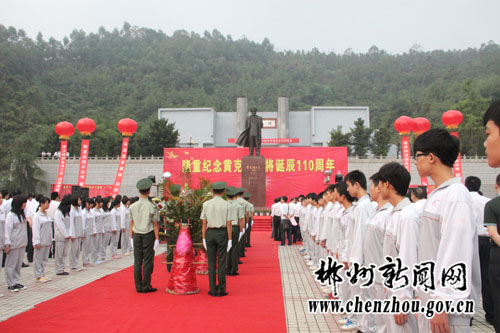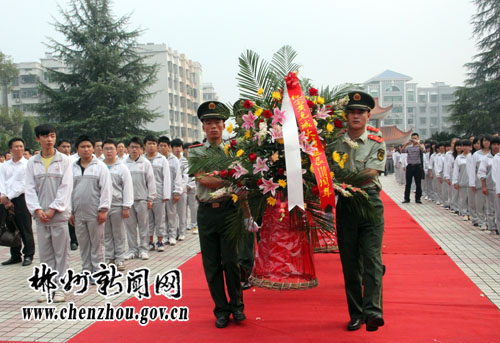110th Year Anniversary Commemoration for Senior General Huang Kecheng’s Birth Held in Yongxing County

110th year anniversary commemoration for senior general Huang Kecheng’s birth was held in Yongxing county

Soldiers offered flowers to senior general Huang Kecheng
It is the 110th year anniversary of senior general Huang Kecheng’s birth on this October 1, 2012. In the general’s hometown- Yongxing county was held a grand commemoration ceremony for memorizing its great achievements on nation independence, people liberation, and country strength. Chenzhou municipal leaders- Chen Shezhao and Duan Tailin, senior general’s relatives, ascendants of revolution pioneers, Yongxing county cadres and some teenagers attended this ceremony.
General Huang Kecheng was born in Yongxing, Hunan, China, and he was the third of four children. His father was Huang Qingzhu (黄清主 Huáng Qīng-zhǔ), and his mother was Deng Longtao (邓龙桃 / 邓龙桃 Dèng Lóng-táo). His family owned six mu of land. Since he was not the eldest son, his parents did not consider it a great priority to provide a good education for him. He worked as a farm laborer on his family land, and completed high school when he turned 20, in 1920, from the Hunan 3rd Normal School. Huang eventually joined Chiang Kai-shek's New Revolutionary Army, and he joined the Communist Party of China in 1925.
In 1929, Huang was serving under Peng Dehuai in a Kuomintang regiment stationed in northern Hunan. When Peng rebelled in June 1928, Huang joined him. Huang led the Yongxing campaign during Xiangnan (South Hunan) campaign in 1928, and participated in major battles encountered by the Red Army Third Division. Huang participated in the Long March, and, upon arrival on northern Shaanxi, he was promoted to be the director of the general political and organizational department. At the beginning of the Second Sino-Japan War, he was the political commissar of 344 brigade, affiliated with the 115 division of Eighth Route Army. His army accompanied Xu Haidong, fighting in regions across Shanxi, Hebei and Henan. After 1940, he became a political commissar in the Eighth Route Army and the New Fourth Army, and later the deputy and logistics commander of Northeastern Democratic Alliance Army.
After the founding of the People's Republic of China in 1949, Huang was appointed governor of Tianjin. He later became the state secretary of Hunan, the Commander of Hunan Military Region and its political commissar, the deputy director of the chief staff and director of general logistics, the deputy minister of national defense, the secretary general of the Central Military Commission, and the chief of staff of the PLA. He was made a senior general in 1955, and awarded the Army Medal, the Independence and Freedom Medal, and the Order of Liberation. He was an alternate and then formal member of the 7th CPC Central Committee, and a member of the 8th Central Committee.
In 1959, Huang criticized the "Great Leap Forward" and "People's Communes" and was denounced as a member of an "Anti-Party group" associated with Peng Dehuai when Peng was criticized at the Lushan Conference. He was deprived of all positions and was placed under investigation. He was partially rehabilitated, but was denounced and persecuted by Red Guards when the Cultural Revolution began in 1966.
In 1977, after Deng Xiaoping came to power, Huang was politically rehabilitated. After being recalled to service, he was appointed as adviser to the Central Military Commission, and executive secretary of the Central Commission for Discipline Inspection. He was selected as central committee member again in 1978.
He died on December 28, 1986 in Beijing.
The attendants visited life story museum. Huang Wanrong who is the General’s niece took photos with family members in front of the general’s statue and recalled the earlier days when she spent with General Huang Kecheng. Mao Xiaoqing who is Chairman Mao’s niece said that it was significant to hold such a kind of activity. General Huang is the model for contemporary cadres.”
Wang Dadong whose father was an old revolutionist fighting for people’s liberation with general Huang came from Beijing to attend this activity. Wang still remembered the old stories with General Huang and all of these inspired him to keep going on.
“The General’s spirit will keep lighting up our heart.” – Chen Shezhao who is the Chairman of Chenzhou CPPCC said in the forum. Chen also stated that the General’s loyalty to the party, people and communism and his frank spirit would inspire all the people later on. Yongxing county should keep discovering its name card as the home of General.




